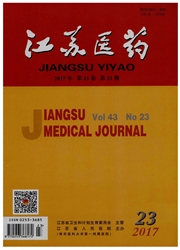

 中文摘要:
中文摘要:
目的探讨联合化疗方案剂量强度对弥漫大B细胞淋巴瘤(DLBCL)患者预后的影响。方法初诊DLBCL患者64例,经化疗方案联合或不联合利妥昔单抗治疗,回顾性分析患者的年龄、国际预后指数(IPI)、化疗方案药物的平均相对剂量强度(ARDI)等因素对患者完全缓解(CR)率和1年生存率的影响。结果患者年龄〉60岁、IPI评分3~5分患者的CR率和1年生存率均低于年龄≤60岁、IPI评分0~2分者(P〈0.05)。患者化疗方案药物的ARDI≤90%的1年生存率亦低于ARDI〉90%者(P〈0.05)。年龄和化疗方案药物的ARDI是DLBCL患者疗效和预后的独立影响因素(P〈0.05)。结论对于初诊的DLBCL患者,治疗过程中化疗方案药物的ARDI可影响患者预后。
 英文摘要:
英文摘要:
Objective To investigate the effects of dose intensity of chemotherapeutic regimen on the prognosis of patients with diffuse large B-cell lymphoma(DLBCL).Methods A total of 64 patients newly diagnosed as DLBCL underwent the treatment of chemotherapy regimens with or without rituximab was retrospectively analyzed.The effects of age,international prognostic index(IPI)and average relative dose intensity(ARDI)of chemotherapy regimen on complete remission(CR)rate and one-year survival rate were evaluated.Results The CR and one-year survival rates were lower in the patients aged 60years old or IPI 3-5 points than those aged ≤60 years old or IPI 0-2 points(P〈0.05).The one-year survival rate was lower in the patients with ARDI≤90% than those with ARDI90%(P〈0.05).The age and ARDI were the independent risk factors for CR and one-year survival rates in the patients with DLBCL(P〈0.05).Conclusion The ARDI of chemotherapy regimen can affect the prognosis of the patients with newly diagnosed DLBCL.
 同期刊论文项目
同期刊论文项目
 同项目期刊论文
同项目期刊论文
 Actived NF-KB in bone marrow mesenchymal stem cells from systemic lupus erythematosus patients inhib
Actived NF-KB in bone marrow mesenchymal stem cells from systemic lupus erythematosus patients inhib In vitro migratory aberrancies of mesenchymal stem cells derived from multiple myeloma patients only
In vitro migratory aberrancies of mesenchymal stem cells derived from multiple myeloma patients only 期刊信息
期刊信息
